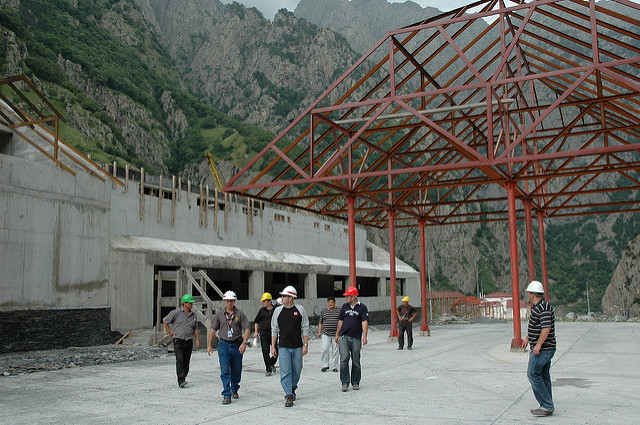Freedom of movement is not simply an economic good, but a bulwark against oppression
Freedom of movement is frequently posited as an economic good, writes Floris de Witte. But it is much more than that. It allows Europeans to pursue a way and quality of life that simply may not be possible in the state where they were born. And in curbing the capacity of domestic politicians to scapegoat and exclude the foreigner, it serves to prevent another descent into intra-European conflict.

A border crossing in Georgia (Credit: US Army Corps of Engineers, CC BY 2.0)
As the debate around a possible Brexit intensifies, it seems to focus more and more on the economic costs and economic benefits of free movement. This discussion, typically, focuses on securing access to the internal market for the UK’s companies, to the skills that the UK can ‘import’ from other member states, but also the possible costs in terms of welfare benefits to which foreign workers become eligible. Much has been said on these arguments already. The purpose of this post is to highlight that free movement also has an important non-economic side to it. It is, for better or worse, about freedom. Missing this element means overlooking what many EU actors, national politicians and European citizens (and in particular its younger generations) understand as the core of the process of integration. It also means that any reformulation of the rules and conditions of free movement is deeply problematic, as many actors involved in such reformulation simply do not see it as a matter of economic costs or benefits. They see free movement as a symbol of European integration.
This non-economic element of free movement can be explained in different ways. For many younger European citizens (depending on the date of accession of their home state to the EU), a Europe of free movement is simply a given. All elements of their daily lives are infused with the results of free movement, whether it is their Polish classmate, their Belgian lecturer at university, their favourite Italian dish, a Czech football player on their favourite team, or Portuguese boss in the local restaurant. These little things matter: we make sense of our lives and of our selves by communicating and interacting with others. The more we become used to ‘others’ being in places that we understand as familiar, local, or ‘us’; the more we take ‘others’ for granted. Free movement, as such, cannot be reduced to an accountant’s cost/benefit analysis. It is so deeply part of how we live our lives that removing its traces would be as if all teenagers or all pensioners were to be banished from our neighbourhoods.
Freedom of action
For the individual European citizen, free movement is also much more than an economic idea. It is about being able to get more out of your life that you can get ‘at home’. It is an idea that allows 761,000 Brits to live in sunny Spain instead of the UK. It is the idea that allows students to get to know other cultures, allows citizens to move to Warsaw, Marseille or Berlin for love, work, to learn a language, to master a culinary tradition, to open a bar in Croatia or Estonia, to decide for themselves what they think is most important in their lives, and act upon it. This more aspirational dimension of free movement is essentially about freedom. It is about the incapacity of states to decide what lives their citizens ought to lead.
If you are a gay couple living in a member state that is illiberal and does not (legally) recognise or (socially) respect your lifestyle, free movement allows you to move to a member state where these prejudices do not exist and where you can live a better life. If you are retired and your favourite pastime is hiking, free movement allows you to move from Amsterdam to the Pyrenees. The absence of barriers to movement, as guaranteed by the free movement provisions, are crucial in facilitating this aspirational quality. Wealthier Europeans will not struggle to move to other states even in the absence of free movement. But if free movement is to be about freedom, about chasing one’s aspirations, it must be freely accessible for all.
The final way of viewing free movement from a non-economic perspective is to see it as the guarantor of the very purpose of European integration, which is to prevent authoritarian or totalitarian regimes. Much of the post-war political project of European economic integration did not primarily serve economic purposes. Primarily, it was about limiting the capacity of nation states to commit democratic suicide and impose the processes of internal exclusion or external aggression that accompanied it. The legally guaranteed right to free movement of citizens, but also of goods, services, and companies, and the right to non-discrimination that comes with such movement, then, serves to hamstring the capacity of domestic political actors to scapegoat the foreigner, refuse them access or the rights that they have accrued. In many continental European political cultures, this argument still holds sway. For many countries, in fact, the accession to the EU immediately followed a period of war, political oppression or totalitarianism. The incapacity of states to constrain the choices of their citizens – through their legally protected right to free movement, that member states cannot deny – is, on this view, simultaneously the most important achievement and core philosophical tenet of the process of integration.
Free movement is about the economy. It is about the movement of workers, the contributions of workers to host societies, and their welfare demands. But focusing only on this economic element of free movement is missing the bigger picture. Free movement is a symbol – for societies, individuals, and politicians. Missing this symbolic element means underestimating the desire and willingness of Cameron’s counterparts to defend it as the most fundamental element of the process of European integration.
—
This blog represents the views of the author and not those of Democratic Audit UK, nor the LSE. It originally appeared on the BrexitVote blog. Please read our comments policy before posting.
—
 Floris de Witte is an Assistant Professor of Law at the LSE. His research deals with the interaction between EU law and political theory, with particular emphasis on free movement, the Euro-crisis and the role of the individual in the
Floris de Witte is an Assistant Professor of Law at the LSE. His research deals with the interaction between EU law and political theory, with particular emphasis on free movement, the Euro-crisis and the role of the individual in the





 Democratic Audit's core funding is provided by the Joseph Rowntree Charitable Trust. Additional funding is provided by the London School of Economics.
Democratic Audit's core funding is provided by the Joseph Rowntree Charitable Trust. Additional funding is provided by the London School of Economics.
Freedom of movement is not simply an economic good, but a bulwark against oppression https://t.co/MLTgbl4qxf
Freedom of movement is not simply an economic good, but a bulwark against oppression https://t.co/4Ioj0SAcxH
Freedom of movement is not simply an economic good, but a bulwark against oppression https://t.co/93kygGtzCk
Freedom of movement is not simply an economic good, but a bulwark against oppression https://t.co/sJlQKcnHt9
Freedom of movement is not simply an economic good, but a bulwark against oppression https://t.co/JaRRTRvYEq
Freedom of movement is not simply an economic good, but a bulwark against oppression https://t.co/kjoNRUKmKg https://t.co/7UME6HJwR9